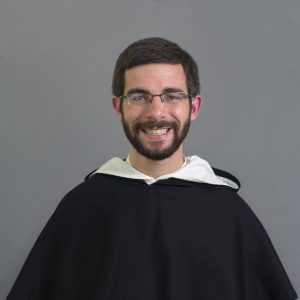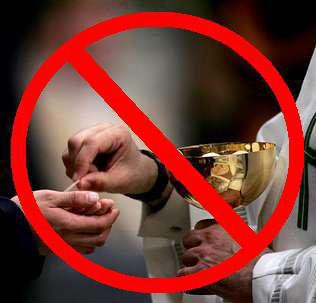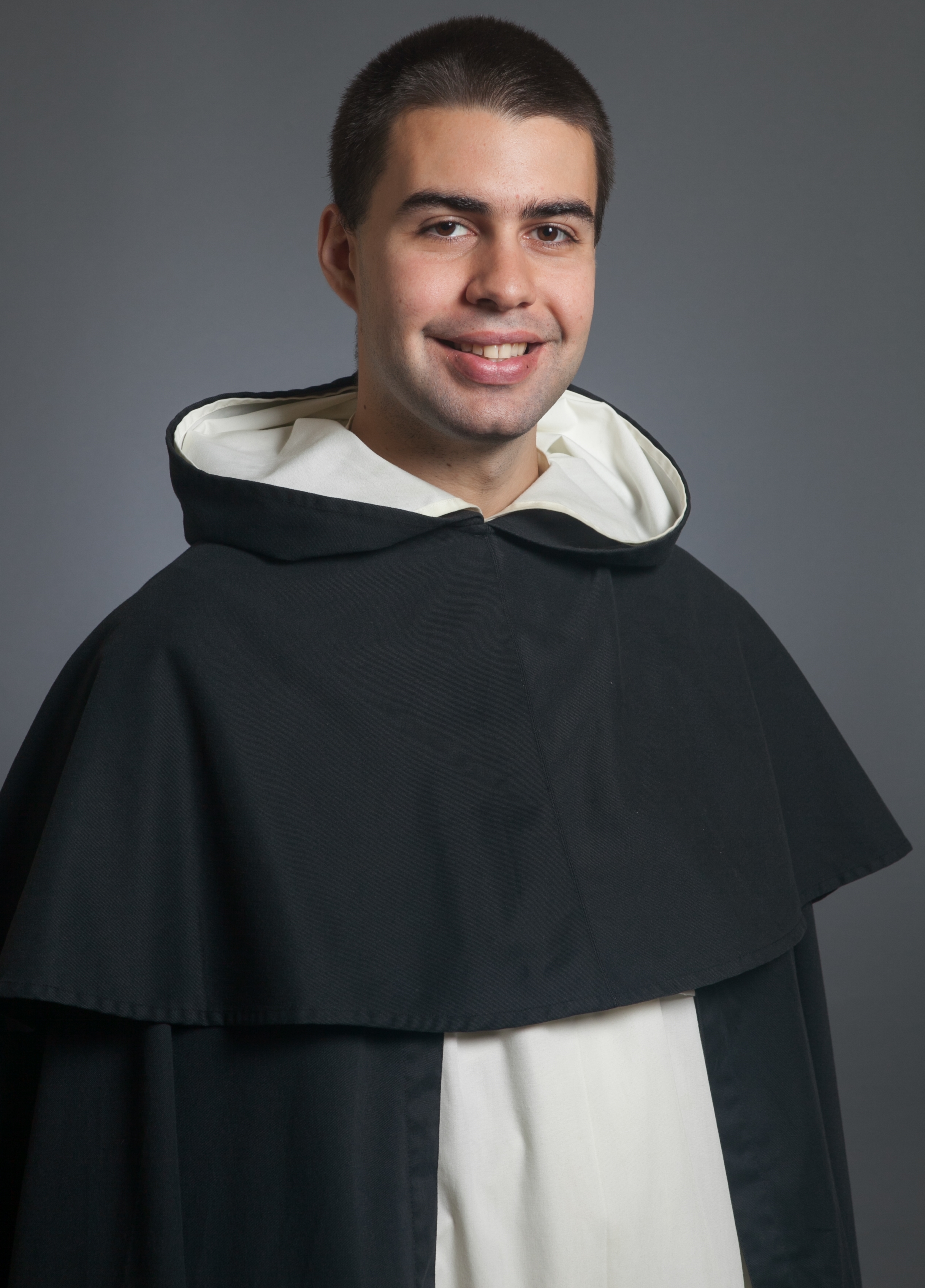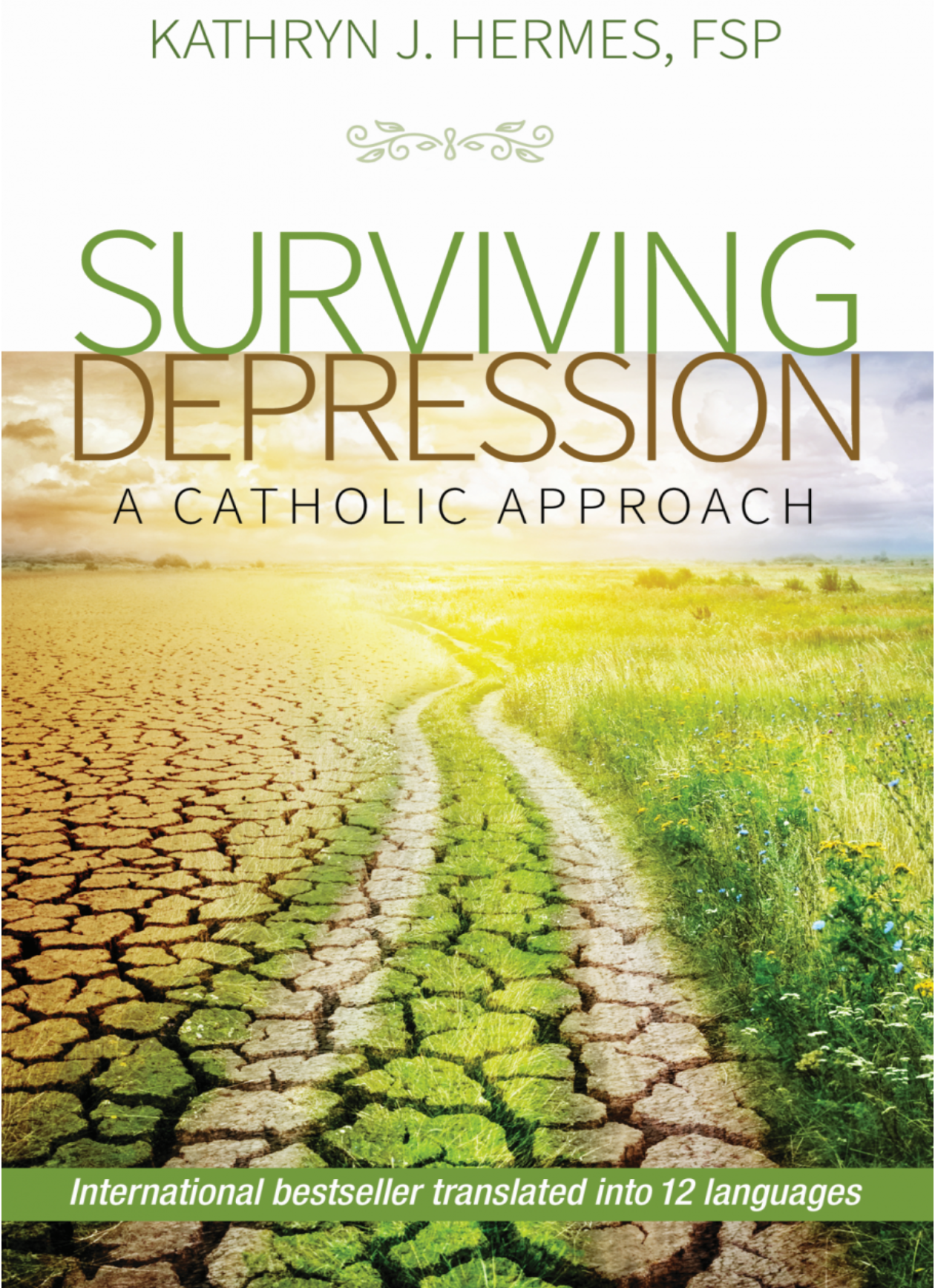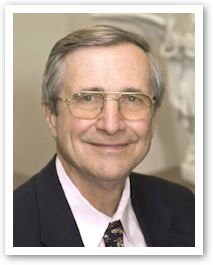Model for the family, the Godhead, the Holy Trinity loves, plays, dances in a communion of persons, as One. Perichoresis (from Greek: περιχώρησις, “rotation”), derived from the Greek peri, “around” and chorea, which refers to “a dance, especially the round dance with its music”. Circumincession from the Latin circum, “around” and incedere meaning “to go, to step, approach”

-Gothic triskele window element
“Most of us understand that love in its truest and highest form involves the giving of self to another person. In that sense, theologians have said the Trinity represents the Father’s and Son’s perfect love for one another. The Father eternally begets the Son, so there was never a time when the Father was without the Son (in Trinitarian theology, the Son’s relationship with the Father is called generation).
Moreover, the Father and the Son look upon one another from all eternity, beholding each other in perfect love, and utter what we might call a “sigh of gladness.” The Roman Catechism says the Holy Spirit “proceeds from the divine will inflamed, as it were, with love,” and from this sigh, the Holy Spirit has existed for all eternity in relationship between the Father and the Son. (In trinitarian theology, the Holy Spirit’s relationship with the Father and the Son is called spiration, from the Latin aspire, which means “to breathe.”)
“O blessed light, O Trinity and first Unity!” God is eternal blessedness, undying life, unfading light. God is love—Father, Son, and Holy Spirit. God freely wills to communicate the glory of His blessed life. Such is the “plan of His loving kindness,” conceived by the Father before the foundation of the world, in His beloved Son: “He destined us in love to be His sons” and “to be conformed to the image of His Son,” through “the spirit of sonship” (CCC 257).”
-Trent Horn
“The theologians in the early church tried to describe this wonderful reality that we call Trinity. If any of you have ever been to a Greek wedding, you may have seen their distinctive way of dancing . . . It’s called perichoresis. There are not two dancers, but at least three. They start to go in circles, weaving in and out in this very beautiful pattern of motion. They start to go faster and faster and faster, all the while staying in perfect rhythm and in sync with each other. Eventually, they are dancing so quickly (yet so effortlessly) that as you look at them, it just becomes a blur. Their individual identities are part of a larger dance. The early church fathers and mothers looked at that dance (perichoresis) and said, “That’s what the Trinity is like.” It’s a harmonious set of relationship in which there is mutual giving and receiving. This relationship is called love, and it’s what the Trinity is all about. The perichoresis is the dance of love.”
–Jonathan Marlowe
“As human beings, we relate to one another in the “dance of life” on this planet. The relationships between the three Persons of the Trinity—”dynamic, interactive, loving, serving”—form the model for our human dance steps. Unfortunately, through sinfulness we corrupt the dance into a choreography of conflict. However, now through the Gospel, Christians have been brought into a special relationship with the triune God. Through Christ’s incarnation, ministry, death, resurrection, and ascension, and by the regenerating action of the Spirit, we prodigals have been brought home and embraced by our Father. Gathered into the household of faith, we now enjoy the feast of the fatted calf, and participate in the dance party that is taking place in the Father’s house. In this way we exemplify the reality and nature of God and bring his Good News to a world that has forgotten how to dance.”
–Michael Spencer
“The doctrine of the Trinity! you ask me what it is. I answer, it is that doctrine that shows us the love of God the Father in giving His Son; the love of God the Son in giving Himself; and the love of the Lord the Spirit in His work of regenerating us, that we may be able to lay hold of the love of the Father by His Son.”
–John Bunyan (1628-1688)
“Christians say God is who you know when you know Jesus. Jesus introduces us to the Triune God. Only the Son knows the Father, and anyone to whom the Son makes him known. Start somewhere else and you end up somewhere else. If the Father did not send his Son in the power of the Spirit to bring us home into the life of God then we have no gospel, we have no Christianity. No other god is worth knowing or telling about.“Without the gospel everything is useless and vain”, as John Calvin put it. “Seek in the whole of Scripture: truly to know Jesus Christ, and the infinite riches that are comprised in him and are offered to us by him from God the Father.” Trinity is gospel. Or in the immortal words of Athanasius’ creed: the saved are those who hold to Trinity. Strong stuff, but what is salvation if not entering into the life of the Triune God? What else is a Christian but someone who knows this God? Christianity isn’t a ticket to heaven. Christianity is what happens when you’re joined with Jesus and step inside his life. Do you need to be able to articulate that fully? No – but it’s not exactly complicated, it’s beautiful. Just look at Jesus.”
–Dave Bish
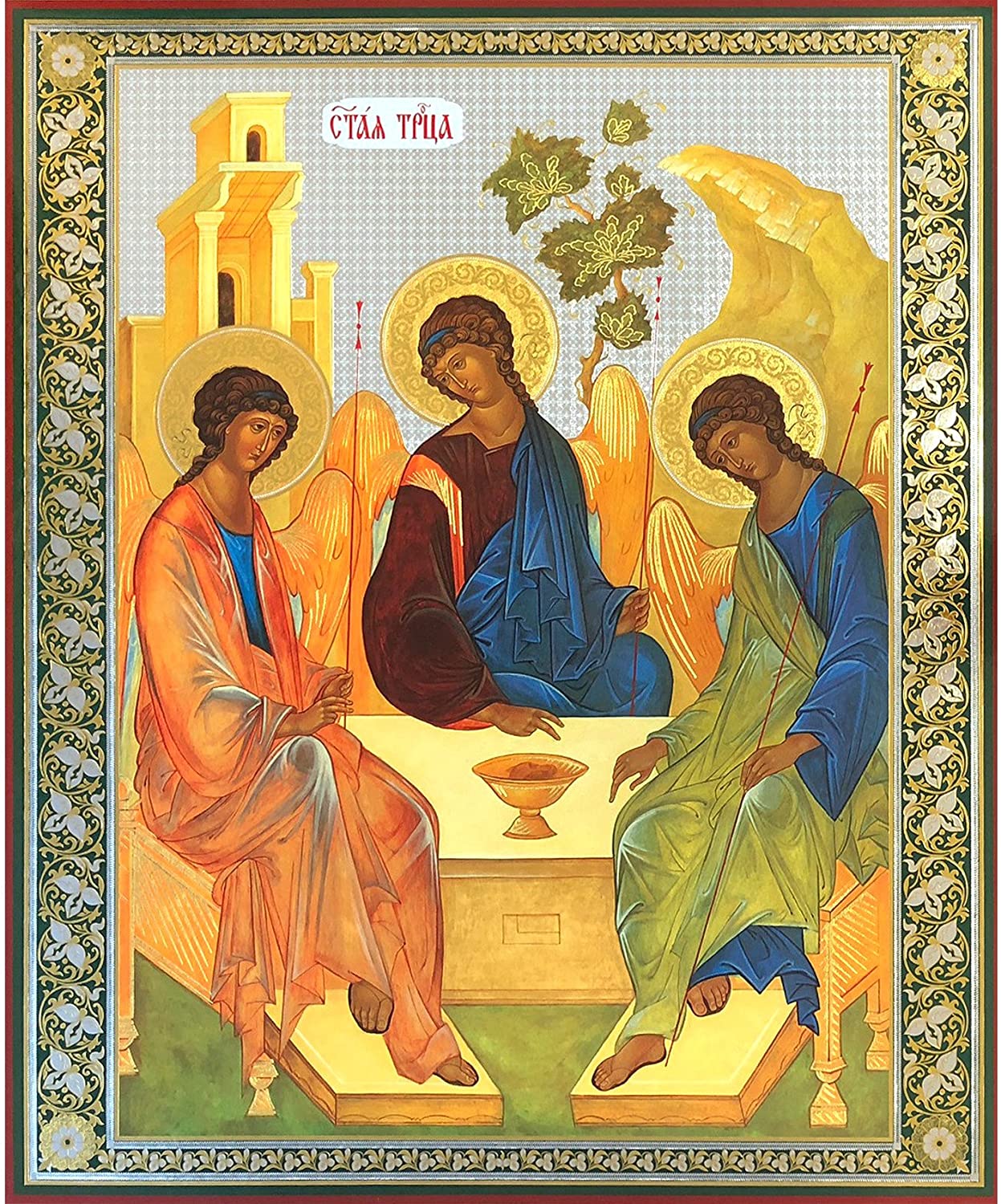
-please click on the image for greater detail
“When the Trinity gets pushed to the margin we lose sight of the fact that Christian faith, life and ministry are ultimately participatory [and not simply a matter of correct legal status before God]. We lose sight of the fact that Christian faith is ultimately union with Christ in the Spirit. When the Trinity slides into the background our understanding of the gospel focuses on forgiveness. However, what Christ did on cross, was not simply to forgive us. It was to restore us to union and communion with the Father, through the Son in the Spirit. All of Christian faith, life and practice is finally participatory.”
–adapted from Elmer Colyer
“Show me your gods and I will show you your people.” This adage holds true. If our concept of God is that of a Solitary Divine Dictator, it follows that we will be suspicious, critical, harsh, cold and condemning. Strong on “truth” and short on love. Joyless members of the righteous remnant. We unconsciously reflect the character of the Divine Being we believe in. Not exactly inviting when your God is like Caesar. If, on the other hand, we have been caught up in the self-giving love of the Triune God who is Father, Son and Holy Spirit; if we have tasted and seen the unspeakable goodness and grace of the God of our Lord Jesus Christ, how can we not be humble, grateful, and generous? We will reflect the overflowing kindness and magnanimity of our God. Forgiven people forgive; welcomed people welcome others; the recipients of grace bestow grace. Their failures have been overwhelmed by mercy—and they can now act accordingly. Those who have been drawn into the abounding life of the Triune God find themselves spreading kindness and goodness and joy. They have been blessed and can afford to bless others—even the ones who are not very agreeable, or doctrinally correct. They don’t need to zero in on other’s errors, because their heavenly Father doesn’t. They can be generous with words, attitudes and resources, because they have come to know a God of unstoppable goodness. They can value relationships, because that is what the Three-in-One God is all about. They can love the lost in all their lostness, because that’s the kind of love heaven lavishes on sinners. People become like their God. And if that is the case, you will want to make sure you’ve got the right God—the Triune God who lives in the Eternal Dance of glory, goodness and grace. The God of Calvary love. The God Christ came to reveal.There is one way of knowing what He is really like—look at Jesus. Look at the cross. Only the Son knows the Father, and those to whom the Son makes Him known. He is a God who lays down his life for others. That is what actually goes on inside the Trinity! Self-sacrificing love. One author described Him as a Supreme Being of “fathomless unselfishness.” The cross was not an accident. It is what this Triune Community is all about. It is what the Bible means when it says, “God is love.” What an amazing Deity He turns out to be!And to believe in Him is to become like Him. A belief in the Divine Dictator tends to produce mean-spirited people. And there’s no reason to become a part of that crowd—because that god doesn’t exist. Moreover, it is highly desirable to pattern one’s life after the true God, Who is Father, Son and Holy Spirit. He looks exactly like Jesus—and we have never ever seen anyone as wonderful as Him!”
–Jurgen Schulz
“God created us so that the joy He has in Himself might be ours. God doesn’t simply think about Himself or talk to Himself. He enjoys Himself! He celebrates with infinite and eternal intensity the beauty of who He is as Father, Son, and Holy Spirit. And we’ve been created to join the party!”
–Sam Storms
“Did you ever stop to ask why I made everything; why My Spirit, My Son, and I created the stars, moon, planets; and why We made paradise on earth? The three of Us were making preparations to throw a party, to invite others to a dance, to the dance We’ve been enjoying since before time began. But there were no ‘others’ to invite. So at a family council, We decided to create people, human beings just like you whom We could enjoy as they enjoyed Us and all the beauty We had made. That’s why We created Adam and Eve with desires that only We could satisfy. Plans for the party were under way.But the story got off track. We knew, of course, that it would. Adam and Eve foolishly decided they could be happier looking out for themselves than trusting Us. They did exactly what you would have done had you been there. They chose to throw their own party, without Us. That’s as foolish as trying to breathe in a room without air or trying to sing when you have no vocal cords. It can’t be done. There is no party without Us, only the prison of loneliness.”
–Larry Crabb
![]()
-please click on the image for greater detail
“The Triune God lives in an incomparable celebration of eternal joy. The Father, Son and Spirit have a rich and overflowing life with or without us. They did not decide to create us for their benefit, but for ours—because that is how God lives. That is how God LOVES! The Father lives for the Son and the Son lives for the Father, and they share all things together in the Spirit. Not self-centered, but other-centered. Totally other-centered—because that is the essential meaning of “God is love.” And this is what “Trinity” is all about. The Three-in-One God is a fountain of blessing and joy and goodness that spills over, that gives and gives and gives. This is who our Creator is, and this is why he creates.C. S. Lewis pointed out: “We were made, not primarily that we may love God (though we were made for that too), but that God may love us.” In so doing, He brings glory to His Name, which means—displaying the wonders of his grace. This is God’s highest glory—his goodness, love and grace. What an awesome and astounding God he is! This overflowing love is what prompted him to create—and to redeem. He is intent upon bringing others into the Triune celebration of eternal joy.”
–Jurgen Schulz
“[T]he shared life of Father, Son, and Spirit – the home-life of the Trinity – is the place where we truly belong. It offers us the fullest experience of the love, joy, and peace we all desire. It is our true home.Perhaps the thing that keeps us from experiencing the love, joy, and peace of our true home is our constant attempt to find these things in a “home away from home.” Do we really believe that our heart’s deepest longings are fulfilled in God? Do we truly believe that our longings for home are ultimately satisfied in God? . . .We must realize that we are not homeless. The truth is that we all have a home. We have been created out of the overflow of love between Father, Son, and Spirit. Home is not a place, but a relationship to which we belong.”
– Richard J. Vincent
“Who can know the truth without the help of God? Who can know God without Christ? Who has ever discovered Christ without the Holy Spirit?”
–Tertullian (c. 160 – c. 225 AD)
“Genuine acceptance removes fear and hiding, and creates freedom to know and be known. In this freedom arises a fellowship and sharing so honest and open and real that the persons involved dwell in one another. There is union without the loss of individual identity. When one weeps, the other tastes salt. It is only in the Triune relationship of Father, Son and Spirit that personal relationship of this order exists, and the early Church used the word “perichoresis” to describe it. The good news is that Jesus Christ has drawn us within this relationship, and its fullness and life are to be played out in each of us and in all creation.”
–Baxter Kruger
“What is the essence of heaven?… [It is the] beatific vision, love, and enjoyment of the triune God. For the three divine persons have an infinitely perfect vision and love and enjoyment of the divine essence and of one another. And in this infinite knowing loving and enjoying lies the very life of the triune God, the very essence of their endless and infinite happiness. If the blessed are to be endlessly and supremely happy, then, they must share in the very life of the triune God, in the divine life that makes Them endlessly and infinitely happy.”
–E. J. Fortman
“From the beginning, God is Father, Son and Spirit, and from the beginning, this God has determined not to live without us. Before the blueprints for creation were drawn up, the Father, Son and Spirit set their abounding love upon us and determined that we would be adopted, that we would be given a place inside their circle of life, and made participants in the very fellowship and joy and glory of the Triune God. There and then, before creation, it was decided that the Son would cross every chasm between God and humanity and establish a real and abiding relationship—union. He was predestined to be the mediator, the one in and through whom the very life of the Triune God would enter human existence and human existence would be lifted up to share in the Trinitarian life. The gospel is the good news that this stunning plan of the Triune God has now become eternal fact in Jesus Christ. In his incarnate life, death, resurrection and ascension, he laid hold of the human race, took us down in his death, recreated us in his resurrection, and lifted us up into the embrace of the Father in his ascension.”
–Athan Smith
“For it is only when you grasp what it means for God to be a Trinity that you really sense the beauty, the overflowing kindness, the heart-grabbing loveliness of God.”
–Mike Reeves
“The triune God is the love behind all love, the life behind all life, the music behind all music, the beauty behind all beauty.”
–Mike Reeves
“Within God wells up an outgoing, boundless tsunami of goodness. There is an unstoppable expansiveness about it. Father, Son and Holy Spirit shared and rejoiced in it together before time began. Their delight in extending and pouring out goodness moved them to create a world that would be flooded in its fullness as the waters covers the sea.The sending of the incarnate Son of God gives even greater testimony to its abounding reality. His ghastly death on a cross is the ultimate display of this irrepressible, overflowing goodness that overcomes all obstacles. Its generous magnanimity is relentless and inexhaustible.“God delights to communicate and spread his goodness,” stated 17th century Richard Stibbes. We have been created and redeemed to be overwhelmed by this torrent of divine beneficence, and it will be the cause of unending, ever-growing celebration. Our enjoyment of this deluge of goodness is never going to stop or diminish. We are destined to be eternally engulfed—so hang on to your hat.”
–Jurgen Schulz
“That God is somehow plurality-in-oneness, that is, intrinsically relational, is the logical necessity of the statement “God is love”.”
–Bruxy Cavey
“God has not willed to live alone, but to create and seek others distinct from Himself upon whom to pour out His Spirit, that He might share with them His divine life and glory, and as Father, Son and Holy Spirit, dwell in their midst forever.”
–Thomas Torrance
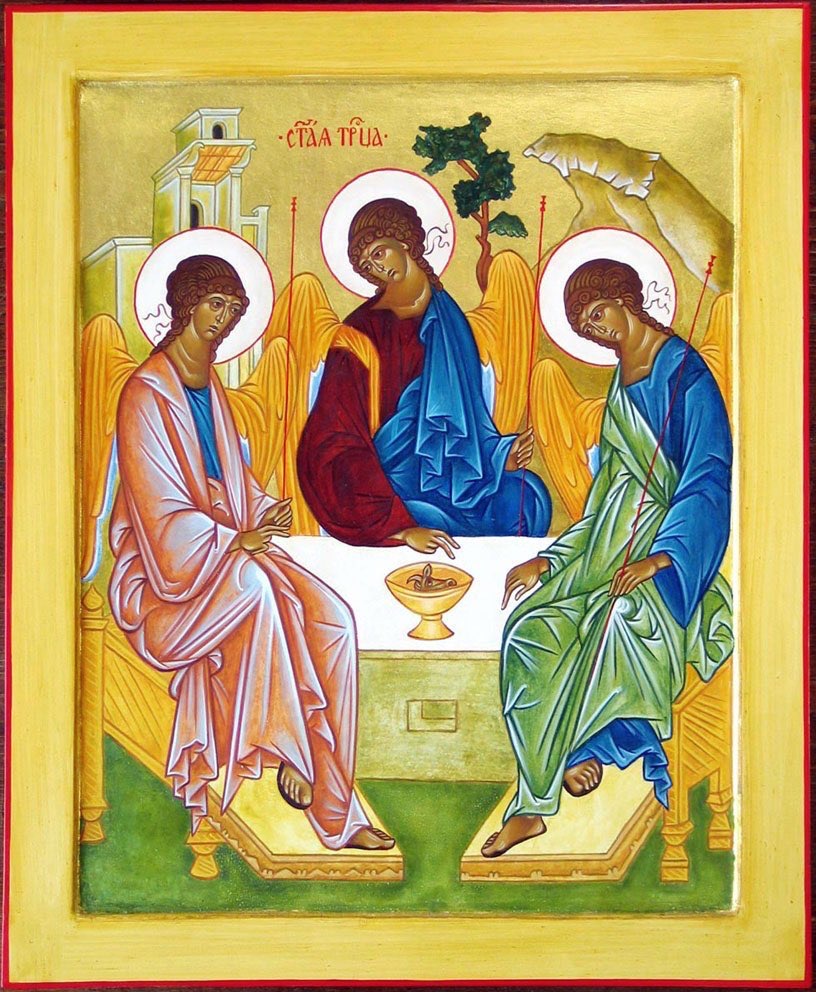
-please click on the image for greater detail
“Please scrap your images of a lonely God hovering over a dark silent abyss, bored and looking for something to do. The universe did not spring into existence in order to give God something to do; rather, the universe was created to give further expression to the rich, vibrant, society of love and creativity that already existed within the trinitarian community of the Godhead . . .The irresistible Dance of the Trinity, full of life and joy, overflowing with love and goodness, could not contain itself and it was only a matter of time before God expanded the scope of the dance and extended the guest list.”
–Jeremy Berg
“Within the divine life there abides an eternal relationship of self-giving, mutual, and shared love. Father, Son, and Spirit deeply and intimately know one another. There is no fear, shame, or insecurity in their knowledge of one another. Father and Son dwell in a face-to-face relationship with the Spirit as the bond of love that unites them. This relationship is so profoundly complete and pure that there is no other way to describe it than that they are in one another [perichoresis]. This free, full, and overflowing love is the central quality of the home-life of God. This is the love we are called to share in the gospel…The staggering truth of our relationship with God is that the love we experience is no less than the eternal love shared between Father, Son, and Spirit. Through union with Christ in the Spirit we enter into this divine love. We participate in the home-life of the Triune God. We are home!”
–Rich Vincent
“Is not relationship the essence of the Trinity? We do not sing “God in three thesis points, blessed Trinity” but “God in three Persons, blessed Trinity.” The Trinity does not deal with time, space, matter, doctrine, or reason, but relationships. God is “Communion” and invites us into that same communion. At the core of who we are as humans is an inner drive for relationship with God and with one another.”
–Leonard Sweet
“The world has a caricature of the Christian. For many a secular observer, the believer is a human disaster. To become a Christian is to abnegate life. No more laughter, no more days of raucous shouting around a football game at a tavern with a good beer. The gusto is gone. The Christian convert has died. Too often, we must admit, this caricature is true. Many Christians have died, not just to sin — which is right — but somehow they have also died to their own humanity, which is wrong. Some have been bound by guilt and legalism, owing to religious inhibitions of every kind. As believers we can become forced, defensive, angry, afraid, isolated, morose, mechanical or spiritually artificial. Yet if our God is truly three persons in infinitely meaningful relationship, then those who are redeemed and brought into relationship with this God have every reason be the most fulfilled and authentic of all the human race. When inhabited by the Holy Spirit, as we walk with the Son, as we take our place as sons and daughters of the Father, our humanness should come alive. Indeed, the Christian’s humanity should luster and glow. Our personhood should radiate because we are in loving relationship with the fount of all personal life. Christians should be the most powerful, sensitive, transparent and truly human of all the people on earth.”
–J. Scott Horrell
“All sorts of people are fond of repeating the Christian statement that ‘God is love.’ But they seem not to notice that the words ‘God is love’ have no real meaning unless God contains at least two Persons. Love is something that one person has for another person. If God was a single person, then before the world was made, He was not love. Of course, what these people mean when they say that God is love is often something quite different: they really mean ‘Love is God.’ They really mean that our feelings of love, however and wherever they arise, and whatever results they produce, are to be treated with great respect. Perhaps they are: but that is something quite different from what Christians mean by the statement ‘God is love.’ They believe that the living, dynamic activity of love has been going on in God forever and has created everything else.”
–C. S. Lewis
“God is not some isolated cosmic bean counter “out there” keeping tabs on us in preparation for Judgment Day, nor is he three Gods with very different ideas about how to deal with humanity. The God of the Bible is one God who is three divine Persons, in perfect unity and accord, who love each other in perfect love and dwell in indescribable joy, and who created us for the express purpose of sharing that life with them through our adoption into Christ, who is eternally the beloved of his Father. That’s why the doctrine of the Trinity matters. If we don’t understand God the way he reveals himself in the Bible, then we wind up with all kinds of messed up, funky and scary ideas about who God is and what he might be cooking up to do to us someday.”
–Mike Feazell
“Here we have a window into the deep inner truth of Christianity. The life of the Holy Trinity—the relationship and beauty and passion, the creative and joyous and abounding fellowship of the Father, Son and Spirit, the love of the Triune God—is given to us in Jesus Christ, shared with our innermost beings . . . Such is the kingdom of God and the very meaning of salvation.”
–Baxter Kruger
“In the doctrine of the Trinity beats the heart of the whole revelation of God for the redemption of humanity.”
–Herman Bavinck
“The most important difference between Christianity and all other religions (is) that in Christianity God is not a static thing—not even a person—but a dynamic, pulsating activity, a life, almost a kind of drama. Almost, if you will not think me irreverent, a kind of dance… (The) pattern of this three-personal life is . . . the great fountain of energy and beauty spurting up at the very center of reality.”
–C. S. Lewis
“Each of the divine persons centers upon the others. None demands that the others revolve around him. Each voluntarily circles the other two, pouring love, delight, and adoration into them. Each person of the Trinity loves, adores, defers to, and rejoices in the others. That creates a dynamic, pulsating dance of joy and love.”
–Timothy Keller
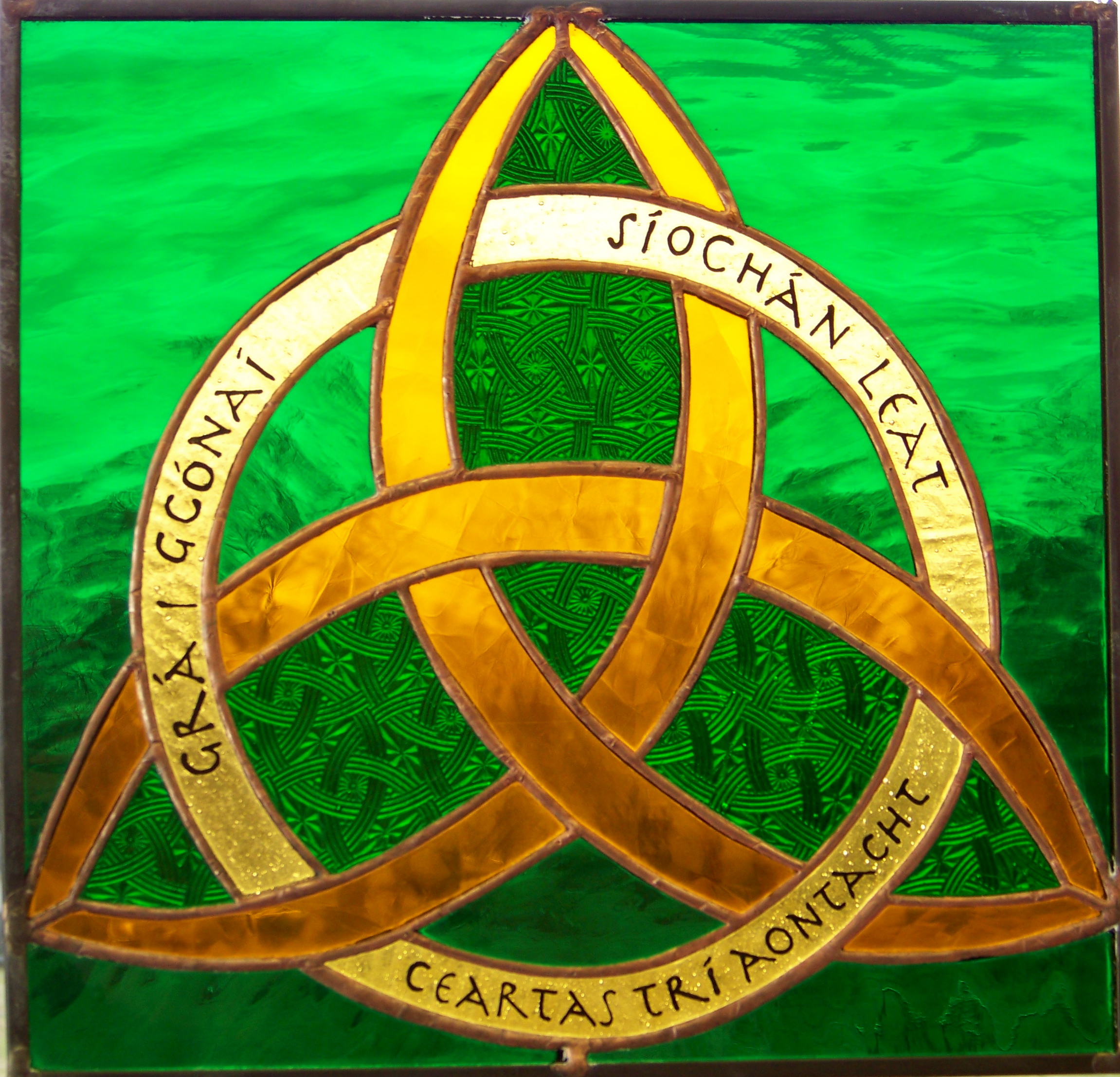
-please click on the image for greater detail
“In the later part of the twentieth century the doctrine of the Trinity captured the attention of theologians more than any other doctrine, and this interest has not waned. At no time in history, since the theologically stormy days of the fourth century, has there been so much discussion on this topic. Books on the Trinity by Protestant, Catholic, and Eastern Orthodox theologians continue to be published. No longer is it thought that the Trinity is an obtuse, secondary, and impractical dogma. It is recognized today that it is nothing less than a summary of the Christian understanding of God given in revelation. The Trinity is the foundation on which all other doctrines are built. It is of immense theological and practical significance.”
–Kevin Giles
“The early church leaders described the Trinity using the term perichoresis (peri – circle, choresis – dance): The Trinity was an eternal dance of the Father, Son and Spirit sharing mutual love, honour, happiness, joy and respect… God’s act of creation means that God is inviting more and more beings into the eternal dance of Joy. Sin means that people are stepping out of the dance… stomping on feet instead of moving with grace, rhythm and reverence. Then in Jesus, God enters creation to restore the rhythm and beauty again.”
–Brian D. McLaren
“At the center of the universe there is a relationship . . . It is out of that relationship that we were created and redeemed, and it is for that relationship we were created and redeemed.”
–Darrell Johnson
“The message held in the mystery of the Trinity is that God is not a monistic singleton God, but rather a Three-in-One of Whom loving relationship is the very essence, for He shares Himself even in the depths of His Own Being. For although He is the one and only Lord, He could not possibly exist alone, even prior to the creation, because God is love and love presupposes a relationship, a plurality (at least) of persons. Without this plurality there could be no love. The very idea of sharing could never have existed, and therefore the creation itself, that monumental act in which the Creator undertook to share Himself with creatures would never have taken place.”
–Mike Mason
“What the doctrine of the Trinity is telling us is that God is fundamentally a relational being… The Father, Son and Spirit live in conversation, in a fellowship of free-flowing togetherness, and sharing and delight – a great dance of shared life that is full and rich and passionate, creative and good and beautiful.”
–Baxter Kruger
“God is burning with love. God is a consuming fire because love is a consuming fire. The Father, the Son, and the Holy Spirit have been in a state of all-consuming but ever-generating love for each other form before all time. This love, being love, is reaching beyond itself, to generate an ever-expanding loving and beloved community. This is what the whole thing is all about. Come on in, if you dare; the fire is fine…This, and nothing less than this is what we’re mystically wired for. We’re mystically wired for more love than we ever thought existed. We’re mystically wired to stand in the middle of love’s consuming fire and not so much as smell smoke.”
–Ken Wilson
“Before the universe came to be, before the heavens were called forth with stars and moons, before the earth was carved in infinite beauty and human life was fashioned with style and grace and glory, before there was anything, there was the great dance of life shared by the Father, Son and Spirit. In staggering and lavish love, this God determined to open the circle and share the Trinitarian life with others. As an act of mind-boggling and astounding philanthropy, the Father, Son and Spirit chose to create human beings and share the great dance with them.”
–C. Baxter Kruger
“To be baptized in the Trinitarian Name is to be immersed not just in water but in the very reality of the Name! We are given the unspeakable privilege of entering into and participating in the Trinitarian community of love! Do you realize that? When we say “yes” to Jesus as Saviour and Lord, we are immersed into the love and life of God the Father; and are immersed into the grace and truth of God the Son; and we are immersed into the power and purity of God the Spirit. Most of us are not yet experiencing and appropiating all that was given to us at conversion. We know something of the love and power of the Father. We know something of the forgiveness and freedom of the Son. We know something of the pervading and transforming glory of the Spirit. But we have yet to know the fullness available in the Triune God. The good news is God will not rest until we do!”
–Darrell W. Johnson
“We belong to the Father, Son and Spirit . . . There is no power in heaven or on earth that can undo the union forged in Jesus Christ. As long as the incarnate Son sits at the Father’s right hand, we are included. For he is no mere man. He is the man, the one in whom the whole human race is bound up.”
–Baxter Kruger
“There is only one circle of life in the universe and we belong to it . . . We belong to the Father, Son and Spirit; the rhythm of the great dance beats in our hearts. To walk to its rhythm is not to move to an alien beat; it is to hit our stride. It is to find ourselves. it is to find home and at-homeness, genuine fulfillment, and the first tastes of everlasting joy.”
–Baxter Kruger
“The gospel is not the news that we can accept an absent Jesus into our lives. The gospel is the news that the Father’s Son has received us into his. We don’t make Jesus part of our world; he has made us part of his. In bearing our scorn, Jesus has made room for the real us in his divine, trinitarian life. Adoption is not a theory or a theoretical doctrine; it is reality in Jesus Christ, for in him the Father himself has met, accepted and embraced us as we are forever. In a variation on Paul’s great statement, ‘For you know the stunning grace of the Father’s Son that though he was rich in the shared life of the blessed Trinity, yet for our sake he became poor, suffering our wrath to meet us, and now through his suffering we who were so poor have been included in Jesus’ own rich relationship with his Father.”
–Baxter Kruger
“There is only one circle of delight in the universe. The Father loves the Son, his beloved, and in him he is utterly thrilled. “Thou art My beloved Son, in whom My soul delights” (Matthew 3: 17; 17:5). We are not to stand before such delight, and wonder how we could ever thrill the Father’s heart like Jesus does. The good news is that we are included in Jesus Christ. We have been given the gift, as Professor James Torrance says, of participation in Jesus’ very own relationship with the Father in the Spirit, and thus in the delight of the Father for His own Son.”
–C. Baxter Kruger
“The center and the matrix of the universe is not a machine or a monastery—it is a dance, a ballet, a perichoresis, an interaction of love between Father, Son and Holy Spirit that is so beautiful, so exhuberant, so marvellous that the Triune God purposed to create us so that we would be part of the dance and participants in the eternal fellowship of the Trinity. Could anything be more amazing than that?”
-Jurgen Schulz
“The . . . larger purpose of the Father, Son and Spirit for humanity is not merely the deliverance from sin and corruption (though this is critical), but our exaltation into the very trinitarian life of God. Real relationship—shared life, communion of the most personal and profound order, union—stands as the driving purpose of God in creation and redemption. Logically speaking, when the great apostle stated that the Father predestined us to adoption before the foundation of the world, he is setting forward the ultimate framework within which we are to understand the coming of Jesus. It is about relationship, about communion, about union with the very life of the Father, Son and Spirit.”
-C. Baxter Kruger
“The origin and cause of our redemption is the ineffable love of God the Father, who willed to redeem us by the blood of His own Son . . . who freely took our curse upon Him, and imparts His blessing and merits to us; and the Holy Spirit, who communicates the love of the Father and the grace of the Son to our hearts. When we speak of this . . . we speak of the inmost mystery of the Christian faith.”
–John Wesley (1703 -1791)
“And now, dear brethren . . . allow me now, most earnestly, to impress upon you the absolute necessity of being sound on the doctrine of the Trinity . . . A gospel without the Trinity! it is a pyramid built upon its apex. A gospel without the Trinity! it is a rope of sand that cannot hold together. A gospel without the Trinity! then, indeed, Satan can overturn it. But give me a gospel with the Trinity, and the might of hell cannot prevail against it; no man can any more overthrow it than a bubble could split a rock, or a feather break in halves a mountain. Get the thought of the three persons, and you have the marrow of all divinity. Only know the Father, and know the Son, and know the Holy Ghost to be one, and all things will appear clear . . . he who understands this, will soon understand as much as mortals e’er can know.”
–C.H. Spurgeon (1834 – 1892)
“Loving mutuality and relationship belong to the essence of God. In recognizing this, theology makes explicit what the heart has always known. Let God be defined not so much by holiness and sovereignty in which loving relatedness is incidental, but by the dance of trinitarian life. And let us see Spirit as effecting relationships, connecting Son to Father, and us to God. Spirit is the ecstasy of divine life, the overabundance of joy… When we render God in this way, not only atheists might come to love Him, but even Christians, for we ourselves often lack a sense of God’s beauty and adorableness. God is the ever-expanding circle of loving, and the Spirit is the dynamic at the heart of the circle. Through him we all have access in one Spirit to the Father, on behalf of whom Spirit and Bride say, “Come!” Let us all join in the dance.”
-Clark Pinnock
“Father, Son, and Spirit . . . [are engaged in a] dance which is their life together, a dance without beginning and without end, a dance which is joy beyond all telling.. . . The music of this eternal dance echoes in the vast reaches between the stars, and pulses in worlds inside of atoms, and travels on every breeze across the earth, and surges with the blood through our veins. From time to time, we hear the music of this eternal dance. During the silences when everything makes sense; during the celebrations when we taste a bit of heaven . . . When we are thankful for what we’ve been given, proud of what we’ve done, hopeful about what the future holds. It is on these great and good occasions that we hear the music of the eternal dance, the rhythm of the Trinity. The Trinity is unending, joyous dance, yet the miracle is that the circle breaks open, and the Son and Spirit, still holding hands with the Father, extend their other hands to us, inviting us into the circle, drawing us into the dance, that we may become their partners, participants in their life.”
-Author unknown
“The Trinity is the origin of human relationships. This is the essence of our being made in God’s image. ‘God is love’ because He has always had someone to love – the Persons of the Godhead. He did not need us, but He wanted a bigger family to share His happiness with. The loving inter-action and inter-dependence of Father, Son and Spirit from all eternity, means that society and fellowship began before angels or men existed. We reflect the perfect matrix of the Trinity in our relating well together . . . At the root of all present-day oppressive dictatorships, divided or monochrome societies, devaluation of certain individuals and the inability to cultivate loving community, is a denial of the Trinity. The Trinity models an image of mutuality, reciprocity and a totally shared life.”
-Greg Haslam
“The doctrine of the Trinity tells us that God’s own being resides in the inter-relations between Father, Son and Spirit. The foundational underlying reality of God’s being is not the individual persons of the Godhead, but their communion of love with each other. Since humans are made in God’s image, this tells us that . . . the essential indivisible constituency of humanity is not the individual, but the community. The existence of the community is ontologically and biologically prior to the individual. Our true humanity is only expressed, not as individuals, but as persons in loving relationship. This illuminates the fundamental characteristic of holiness – perfect love. The holy person is the person who loves in relationships. Notions of holiness cannot be abstract, detached or impersonal. Rather, they must be concrete, involved and relational.”
–Richard Liantonio
“Our walk with God is shaped by our view of God. A non-trinitarian understanding of God leads to a spirituality fundamentally different from that which results from believing in a self-giving, self-sacrificing God who exists in a community of oneness. Theology radically impacts behaviour. If absoluteness, power and transcendence are the essential characteristics of God, then performance, not relationships, becomes the main issue. The Solitary Sovereign looks for obedience, not intimacy; he seeks compliance, not community. Faithfulness entails keeping the rules and maintaining proper behaviour. It is not surprising that a non-trinitarian view of God typically leads to a legalistic obsession with externals, proper formulas, and “getting it right.” We end up with a kingdom of “correctness.” “Unity without multiplicity,” observed Blaise Pascal, “is the route to tyranny.” A very different spirituality develops from a belief in relational God who exists as Father, Son, and Holy Spirit in the divine community of love. He is the Three-in-One God who said, “It is not good that the man should be alone” (Gn. 2:18). He is the Father who races to embrace and kiss his returning prodigal son, and throws a party to celebrate his homecoming (Lk. 15) He is the God who sent His Son and poured out His Spirit to redeem and include sinners in the eternal joy of the triune fellowship of love. Community, mutuality and love are at the core of who He is. And we should not expect His blueprint for us to be otherwise. Trinitarian spirituality responds to the unconditional love of God—the staggering fact that we are loved with the same love the Father has for his Son. It dares to believe that at the centre of all things is a Fountain of Triune Love. It involves possessing “eternal life”—which is knowing the Father and the Son (Jn. 17:3), and actually becoming “partakers of the divine nature” (2 Pet. 1:4). Faithfulness to the Triune God entails much more than behaviour modification; it means living within His loving embrace. It means knowing that growth and change happen inside the embrace—not as a condition for receiving it. And in this trinitarian atmosphere of grace and goodness we are increasingly prompted to move in the direction of wholeness, holiness, obedience and service. “Your image of God is the single-most important element of your spiritual journey,” rightly affirms Graham Cooke. If the God we worship is the Solitary One who reigns in sovereign aloneness, we will arrive at a spirituality built on fear not love, on performance, not fellowship. It will be all about correct belief and behaviour—and make sure you get it right! If, on the other hand, we worship a Father, Son and Holy Spirit, who live in the togetherness of their mutual delight, passion and goodness, a very different spirituality emerges. We can learn to be vulnerable and authentic, to value relationships and beauty, to love, serve and give, to live with gratefulness and joy. We can stumble and fail and know we are still accepted. We have become amazed participants in God’s abounding triune love that will not let us go. The contrast between the two spiritualities is stark. John Wesley declared that the Trinity is a truth of crucial importance that “lies at the heart of all vital religion.” Robert W. Jenson stated, “The Western Church must either renew its trinitarian consciousness or experience increasing impotence and confusion.” German theologian, Jurgen Moltmann, insists that the renewal of Christianity must find its source in the doctrine of the Trinity. A trinitarian-shaped spirituality is not only Biblical—it’s transformational.The believer in Christ has been brought into the Triune circle of life and glory. Could anything be more wonderful than that?”
-Jurgen Schulz
“God’s eternal experience of love results in a constant state of joy. God is “the blessed God” (1 Timothy 6:15). This joy springs from God’s delight in the self-giving, mutual, shared love and life of Father, Son, and Spirit. How could such a relationship not bring joy? As with his love, God invites us to share his joy. This joy was the constant experience of Jesus during his earthly ministry. In the face of certain doom, God’s joy sustained and carried him. On the night before his crucifixion, he called his disciples to share his joy – the divine joy: “Just as the Father has loved me, I have also loved you; abide in my love. If you keep my commandments, you will abide in my love; just as I have kept my Father’s commandments, and abide in his love. These things I have spoken to you, that my joy may be in you, and that your joy may be made full” (John 15:9-11). In his high priestly prayer, he made this request to the Father, “But now I come to you; and these things I speak in the world, that they may have my joy made full in themselves.” (John 17:13)As C. S. Lewis wrote, “Joy is the serious business of heaven.” God takes joy seriously. It is not a marginal experience for God. It is the passionate overflow of delight and desire between Father, Son, and Spirit. Unlike happiness, joy is not rooted in circumstances. It is rooted in our relationship with God. In God, joy is an unchanging reality because the shared life and love between Father, Son, and Spirit never grows old or dies out. The eternal reality of divine love and life is the eternal basis for unending joy and delight: “Rejoice always” (1 Thessalonians 5:16); “Rejoice in the Lord always; again I will say, rejoice!” (Philippians 4:4)The joy of God is not superficial, but deep. It is a joy that persists in the presence of trials, suffering, and even sorrow. These negative experiences come and go. Though difficult to endure, they do not remove or negate the glorious presence of God in our lives. As such, we continue to rejoice in spite of our suffering and sorrow. “You also became imitators of us and of the Lord, having received the word in much tribulation with the joy of the Holy Spirit” (1 Thessalonians 1:6).”
-Richard J. Vincent
“Why do you balk at the doctrine of the Trinity – God the three in One – yet meekly acquiesce when Einstein tells you E = mc2?”
-Dorothy L. Sayers
“St. Thomas Aquinas (ST II-II q. 168, a. 4). Man ought to strive to live in accord with right reason. Certainly, it is reasonable to take rest and refreshment when necessary. In respect to the body, for example, it is reasonable to eat sufficient food and to sleep a sufficient amount each night. Eating or sleeping too much would be irrational and thus sinful, but so would eating or sleeping too little. Rather, the virtuous man gives his body its due rest so that it can function at its best.
The same holds true in respect to the soul. Just as when the body is tired it should be rested and refreshed by food and sleep, so too when the soul is tired it needs to be rested and refreshed. The soul is tired by intellectual efforts, such as study or contemplation of divine things. The soul is rested and refreshed by pleasure, and this is obtained by “play,” “games,” or “recreation.” Saint Thomas is unambiguous on this point, “Now such like words or deeds wherein nothing further is sought than the soul’s delight, are called playful or humorous. Hence it is necessary at times to make use of them, in order to give rest, as it were, to the soul” (ST II-II q. 168, a. 2).
Since we are inclined to that which gives us pleasure, it is much easier to sin by an overabundance of mirth/play than by a lack thereof. Man more often fails to reach authentic happiness by being lost in the pursuit of pleasure than by refraining from it. Yet, one would be foolish to think he can completely dispense of pleasure and still be a happy and holy man.
What then does reasonable rest for the soul look like? How can we be sure we are not going overboard/underboard? Three points will keep us on the reasonable road in respect to play (ST II-II q. 168, a. 2).
- We must ensure our recreation in no way includes anything evil in itself. If we sin by deed or word in the course of recreation, the recreation itself will be sinful and will give the soul no real rest.
- We must not completely disrupt the balance of our minds by our recreation. Recreation should truly be a re-creation: a recollection, not a dissipation, of the soul’s strength. Thus, we should avoid recreation that leaves us more tired and spent than we were beforehand. It makes no sense to stay up late into the night partying or playing games in the name of refreshing the soul only to be exhausted in body and soul the next morning.
- We should recreate according to our person and circumstances. As with sleep, some need more recreation, and some need less. Moreover, some find relaxation of the soul in certain things that others would find burdensome. Some recreations are fitting for children, and there are others befitting the old. Each should know himself and seek the measure and form of recreation proper to himself. Further, particular kinds of recreation are appropriate at particular times and places, but not in others. We must attend to all the circumstances to determine how to recreate reasonably.
If we attend to these things, we will be able to give due rest to our souls, according to reason. This may seem a small matter, but its import is great. Only the well-rested soul is able to labor well at its intellectual tasks, the greatest of which is the contemplation of God—for which man was made and in which his highest happiness is found. Thus, the saintly soul is one who knows the right time for contemplating God and also the right time for duking it out on the chess board.”
Love & play & dance & communion of persons in love,
Matthew


